Les Paul on Jeff Beck, EVH and More
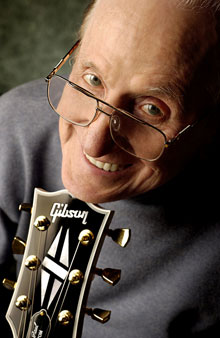 Didn’t Play Stock LPs, Hated the SG, Tried to Get Zep Back Together?
Didn’t Play Stock LPs, Hated the SG, Tried to Get Zep Back Together?
After Les Paul died last week, several sites posted tributes to him. Ultimate-guitar.com had an interesting series of articles, all by Steve Rosen, which are excerpted here but are worth a full read.
Les Paul was a brilliant guy, an innovator well beyond the instrument that bears his name, and anyone involved in rock music owes him at least a thank-you. Here’s how Rosen puts it:
“Les Paul, nee Lester Polfuss, born on June 9, 1923, in Waukesha, Wisc., has just about done it all. He designed and built the electric guitar bearing his moniker in 1941, developed the first multi-track machine, conceived and made viable such concepts as echo, phase shifting, and slap back delay, and created a style of guitar playing which has been emulated and stolen by everyone from Jimmy Page to Jeff Beck to Edward Van Halen.”
Yes, he was that important to modern music. Following are some words from the man himself.
On Beck, 1978
“From the time I first heard Jeff, I liked his playing very much. One of the things that attracted me to him was his consistency and the second thing was his phrasing. And the heart that he played with.”
“…when I first heard some of the rock players, they were just playing notes and not saying much. And this is where Jeff doesn’t have to necessarily play a fast run to prove a point.”
“…when I saw him in person, I was more than pleased because again, he didn’t get carried away by overplaying. And that makes me extremely happy.”
“Among all the guitar players that I know of in the rock field, Jeff Beck has more taste and more going for him than any of them.
“I always believed in making the guitar cry and say something, and Jeff does [too].
Convo With EVH, 1986
Interviewer: Have you two ever met before?
Les Paul: Never
Les, do you know about this guy sitting across from you?
Paul: I know all about him.
Do you listen to his music?
Paul: Of course. How can you not? And enjoy it…. We had a mutual friend and he used to bring Eddie’s records over to the house, so I kind of heard Eddie. And then my daughter used to live a short distance from where Eddie used to practice with his band out in Arcadia…
Van Halen: Pasadena.
Paul: Pasadena, yeah. Well, anyway my daughter used to live right near there and I said, ‘‘Who’s the guitar player over there?†And so I heard Eddie before Eddie knew I was listening to him.
Van Halen: Did you design all the Les Pauls?
Paul: Yeah, all of them. It all started just a couple of blocks from here [Hollywood]. That’s where my house was until they moved it. And that’s where I invented the eight-track, that’s where I invented the reverb, the delay, the echo. And sound-on-sound and the electric guitar and all that. The headless guitar among others. Steinberger.
Van Halen: Steinberger.
Paul: Steinberger. They just copied it. They came down and asked if there would be any friction or any ill feelings if they copied what I had done. I got the guitar out and showed it to ‘em. But I had showed it to Gibson prior to that and Gibson wasn’t interested in building one. So I said [to Steinberger] ‘I wish you luck.’
Van Halen: When Leo Fender was doing his thing and you were doing yours, was there ever any kind of competition?
Paul: Not at all, no.
Van Halen: Did you ever collaborate or talk together about things?
Paul: Oh, absolutely. Leo Fender would come right over here two blocks away on Curson Street and so would his engineers. And they saw the Log [Les Paul’s solidbody prototype], they saw the guitars that I had built, they saw me pounding them out on the pavement, they saw me making the Headless Wonder. They saw all this happening.
Van Halen: It’s very funny because what I actually use is a combination of what you built and what Leo Fender built. You had the humbucking pickup which was great.
Paul: But not in ‘52.
Van Halen: Right, but still those soapbar things were still less hum or signal-to-noise ratio than the actual Strat pickups. And then what year was it, ‘56 or ‘57, when you came up with the humbucking? I use that in a StratÂstyle body and to me it’s a perfect combination. That’s why I was curious if there was any friction between you guys.
Paul: Oh, never any friction. In fact, from 1941 when I designed the guitar that came out as the Les Paul guitar, what happened between 1941 and 1951 was, Gibson kind of tacked the name on me, that “broomstick with the pickups on it.†And from 1941 until 1951, couldn’t convince Gibson to do a damn thing about putting out a Les Paul guitar. And it took Leo Fender to pick up on that idea from the garage in the backyard and perhaps many others. Leo decided to come out with the Fender line and immediately Gibson says, ‘Find the character with the broomstick with the pickups on it,’ and so they asked me to design a guitar. And I thank Leo for coming out with his because it woke Gibson up. Because Gibson was asleep and Fender was not asleep. And of course that’s the way it goes.
Les rips it up (seriously!) on Waiting for the Sunrise
On His Own Les Pauls and the SG
Les Paul: “[His guitar] has a Gibson name on it, but actually I get in there. When my brother-in-law was alive he did all the work for me. I would teach him to do that. And then there are two other guys out there who built guitars and electronics for me.”
Then the guitars you built for yourself are really not Gibson instruments?
“When I made my deal with Gibson, they got everything but the electronics. The electronics weren’t of interest to the people out there anyway—they wanted high impedance, I wanted low impedance. I wanted a different sound, and so forth. And what we did was we made the guitars that the guitar player wanted. And the only problem I ever had—well not the only one but the only one that sticks out in my mind— was to convince the fellows up in the ivory tower that this is what the kid wants. So I have to get to the emperor somehow and convince this turkey that he ought to get his act together. And it’s very difficult to tell the president of any outfit or anybody that has any stature that what he should do is go to a music store and for a month wait on the customers. And find out just what the hell it’s all about. They don’t do that. They sit in that ivory tower and tell you what it’s all about.
“See, they’re tooled and they’re thinking of millions of dollars to move something a quarter of an inch. That would cost a fortune. And another thing comes into the picture that I can think of which is ridiculous but true. And that is why in God’s world would you do it that way and he says, ‘My wife thinks it looks better that way.’ They’re not thinking what it sounds like, they’re thinking what it looks like.
Paul: I had a case where they put out a guitar without my blessings and I made ‘em stop it. [But] they didn’t stop it and it’s still the number-one seller [much laughter]. So you can be wrong. They put out an SG, a Les Paul guitar, and it wasn’t with my blessings at all. They put the pickup in the wrong place, they made the body too thin, you could pull on the neck and change keys, and a lot of things wrong with it. So I said, ‘Clean that one up a little bit, will ya, before you put my name on it?‒ So they took my name off it and continued to make it and it’s their number-one-selling solidbody. Sure, it’s a cheap guitar and it’s not as good sounding as the others and it’s a double-cutaway – it’s a different thing, and it turned out that I shouldn’t have said what I said.
Van Halen: You know what I did once with one of those? It was a Les Paul Junior, a white one, double-cutaway SG body, and I had to do this slide overdub on a song called “Dirty Movies†on our fourth album. And still, even though it had a double-cutaway, I couldn’t get up high enough. So I had to take a saw to it.
Paul: I love it, I love it.
Van Halen: I’m not one to really…I’m not very much into cosmetics.
Paul: You don’t hold any guitar sacred?
Van Halen: Well, soundwise, yes. See that’s what I was going to ask you was when you designed these guitars, you designed them for sound or for cosmetics?
Paul: Sound. Design is important to make it hookable but actually I’m concerned….
Van Halen: It’s got to look cool, but it better sound good.
Paul: Exactly. That’s why we put that finish on it and made it with an oval top so you could have that clean, violin look to the guitar. Which is so distinctive with the Les Paul guitar and makes it look like a Stradivarius and you associate it that way.
Van Halen: Another question? I own about five Les Pauls but two of them are nice ones: a ‘59 flametop and a ‘58 which is not really a flametop but it sounds great. And I have a couple of Les Paul Juniors and this and that. Which body design and pickup configuration are you the happiest with?
Paul: For me personally, none of them. And so I don’t use any of those.
Van Halen: So you play a Fender [laughs].
Paul: No [amidst much laughter in the room]. I happen to have Leo’s third Fender and he gave that to me as a gift. It’s not called a Telecaster and it’s before the Broadcaster. He had no name on it at the time. Just the name Fender. It’s one of his gifts to me when I was on Curson Street here in Hollywood in ‘47 and ‘48. As far as I’m concerned what I do is I have Gibson make a Custom for me, the way I want the neck, the way I want the frets, the way I want the pickups slanted and whatever. And exactly how many turns and what magnets to use and on and on and on and on. And then check the guitar and if it isn’t right, we make more changes.
Van Halen: When you pick up a guitar, which guitar do you pick up?
Paul: The 1975 Deluxe is the one I like the feel of the most. But that just happens to be a bunch of rejects.
Van Halen: Those are the ones I love. Got any extras laying around? I’m serious.
Paul: You really like Deluxes?
Van Halen: I’m serious. I’m saying, if it’s a reject and he [Les] likes it, I know I’ll like it.
Paul: Well, not necessarily because everybody has their own feel.
Van Halen: I can guarantee you.
Paul: Everybody has a certain thing in their head of what they want to do and how to do it and their technique. Everything about them calls for certain requirements.
Van Halen: I’m getting a feeling from you that you go for the same…thing that I go for. It’s not the appearance of the goddamned thing—I don’t care if it’s a flametop or I don’t care if it’s whatever. The feeling of it and the way it sounds.
Les on Various Things, 1990
Have you learned anything from listening to modern rock and roll?
“Well, a little but most of it is like eating a United Airlines dinner – when you get off the plane and someone asks what you had for dinner you can’t tell them. When you get out in the parking lot after a concert you hear all the kids saying how great it was, but if you ask one of them to sing a song they can’t even hum a bar. Because it’s loud, you’ve got a million dbs flying around, and the guys playing it can’t even stand it. There is some music out there which is not good and then there is some great music. What’s missing out there is the melody….”
Let’s get technical for a minute – what is the main guitar you’ll be using on [an upcoming rock-oriented album]?
A 1980 Les Paul Heritage and I love it dearly. The pickup I use are my own, but that’s the only thing different than a standard guitar. These pickups were on the guitar years ago but Gibson discontinued them because they were something people weren’t ready for. Now Gibson wants to put them out but I still don’t think the public is ready for them. These pickups have a very clean, clear sound, and that’s how I would describe my sound. Pure.
Sort of on the trebly, high end side?
You got it – very sterile, very meticulously clean. And with the least amount of distortion possible. What the rock generation, the heavy metal kids, are going for is raunchy, dirty, angry sounds – a lot of balls to it. They want power and this massive wall-to-wall sound. So we make those instruments at Gibson. I sit and design them although it’s not my goal is life. I don’t put them down for that, I say ‘Go for it, fella.’ Because he has something to say too. But it’s no longer a guitar per se, it’s rrrrrhhhhh (imitates distorted sound). But Led Zeppelin did leave their mark. When Jimmy (Page) comes down to Fat Tuesday, he sits in the front row and just shakes his head. He’s floored. When I talk to Jimmy, I’ll say, ‘You know Robert (Plant) is right down there at the end of the bar. You’re going home together on the same plane and why don’t you talk about getting your act back together?’
How would you describe your philosophy of life?
Well, I guess it might be ‘If you can’t buy it at Sam Ash, I better build one.’ And you just have to be strong to be in this business. I mean, I look at someone like Jimmy Page and he knows he’s talented but somehow there’s a weakness there. I don’t know why someone that talented only looks at his weak points. Mary [Ford, his deceased wife] was that way: Mary never thought she was any good. She was probably the most talented person I ever met. Mary was afraid, and I can see that even with all that talent, Eddie (Van Halen) is afraid. Why do they drink? Why do they take drugs? It’s because they’re insecure.”
Category: Edward Van Halen, Fender, Gibson, Jeff Beck, Les Paul, Les Paul (Lester himself)






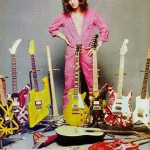
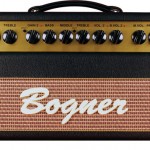
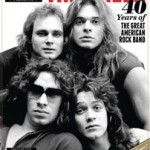
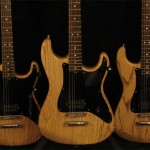


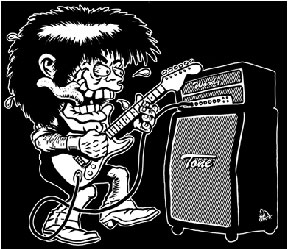

BTW – Les was born in 1915 [http://en.wikipedia.org/wiki/Les_Paul%5D